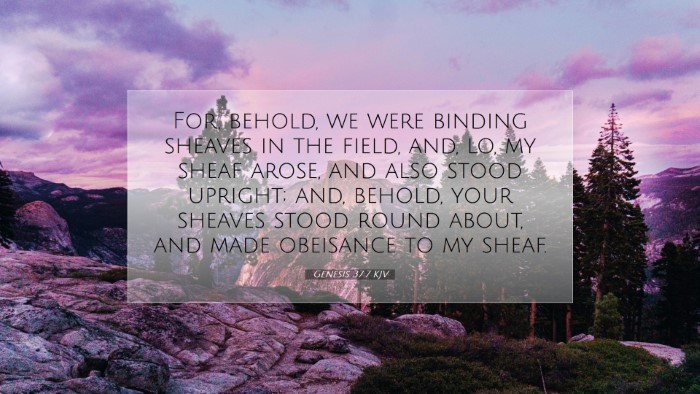Commentary on Genesis 37:7
Verse: "For, behold, we were binding sheaves in the field, and, lo, my sheaf arose, and also stood upright; and, behold, your sheaves stood round about, and made obeisance to my sheaf."
Introduction
This verse is a pivotal moment in the life of Joseph, marking the beginning of a series of prophetic dreams that foreshadow his future and the fate of his family. The interpretation of this verse can be enriched by considering insights from various public domain commentaries, such as those by Matthew Henry, Albert Barnes, and Adam Clarke. Each of these scholars provides a unique perspective that contributes to a deeper understanding of the text.
Contextual Analysis
Genesis 37 introduces Joseph, the favored son of Jacob, and sets the stage for the unfolding narrative of the patriarchal family. The verse highlights Joseph's dream of sheaves which symbolizes his future prominence and the eventual subservience of his brothers. The cultural context of agrarian life in ancient Israel, where sheaves of grain represented both sustenance and wealth, is crucial to understanding the implications of his dream.
Joseph's Dreams
Joseph's dreams serve as a prophecy and a revelation of God's plan for him. In these dreams, the act of binding sheaves in the field illustrates not only the daily activities of agrarian life but also the foundational concept of authority and honor within familial structures. Joseph’s sheaf rising upright signifies his future elevation among his family and highlights a divine calling.
The Response from His Brothers
The reaction of Joseph's brothers to his dream is critical. The dreams evoke jealousy and anger, indicating a rift in familial relationships that will only deepen as the narrative progresses. This response can be examined under the light of the human condition—struggles with jealousy, pride, and the dynamics of sibling rivalry, which resonate throughout biblical narratives.
Commentary Insights
Matthew Henry's Perspective
Matthew Henry emphasizes the divine providence at play in Joseph's life. He notes that Joseph's dreams were not mere fantasies but prophetic visions ordained by God. Henry asserts that the dreams convey a message of hope and future glory despite present trials. He also warns against the dangers of envy and discord that arise within the family unit, a theme prevalent throughout Scripture.
Albert Barnes' Reflection
Albert Barnes provides a thorough exegesis on the symbolism of sheaves and their significance in the agrarian society of the time. He notes that the image of sheaves bowing before one another conveys a powerful message of future hierarchy and respect. Barnes also highlights the theme of divine revelation, suggesting that God communicates His will through dreams, a subject pertinent to the understanding of prophetic literature in Scripture.
Adam Clarke's Commentary
Adam Clarke delves into the psychological aspects of Joseph's dreams, suggesting they reveal not only divine destiny but also Joseph's own naivety at sharing such dreams with his brothers. Clarke acknowledges the complexities of family relationships and offers insights into how dreams can reveal both truth and conflict, inviting readers to consider their undertones within the biblical text.
Theological Implications
The implications of Genesis 37:7 reach far beyond the narrative, inviting pastors, theologians, and scholars to reflect on themes of providence, authority, and familial dynamics. The dream signifies God's sovereignty and planning, suggesting that God's purposes will be fulfilled regardless of human actions. It also challenges believers to recognize and address issues of jealousy and rivalry within their communities.
Providence and Sovereignty
The theme of divine providence is paramount in understanding the overarching narrative of Joseph’s life. His journey from betrayal to prominence in Egypt elucidates a deep theological truth: that God’s plans often unfold in unexpected ways. This prophecy through dreams can be viewed as a precursor to Israel’s eventual redemption and deliverance during the famine, emphasizing the interconnectedness of Joseph's story with Israel's identity.
Human Relationships and Dynamics
Joseph's dream ignites conflicts rooted in envy and mistrust, highlighting the importance of reconciliation and forgiveness—fundamental themes in Christian theology. Understanding these relational dynamics can aid pastoral care and congregational health, encouraging open conversations about rivalries and conflicts within the body of Christ.
Conclusion
Genesis 37:7 encapsulates the beginning of Joseph's transformative journey, rich with prophetic promise and familial discord. By weaving insights from Matthew Henry, Albert Barnes, and Adam Clarke, we enrich our understanding of this text, recognizing it as a source of theological reflection on providence, authority, and the complexities of human relationships.
Readers are encouraged to explore this verse not merely as a historical account but as a living narrative that continues to speak into the lives of those engaged in the biblical text, inviting them into deeper encounters with God’s unfolding story.


